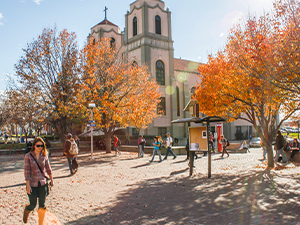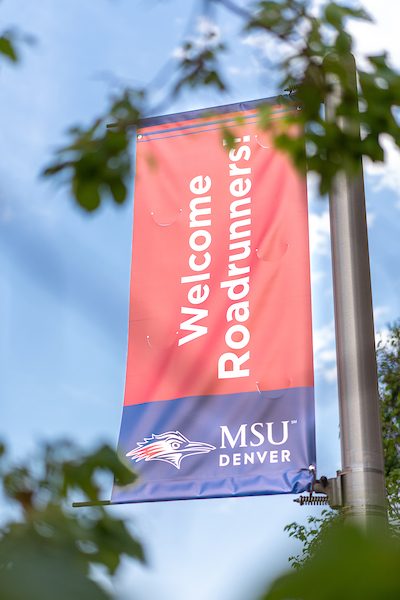Request Information
Ready to find out what MSU Denver can do for you? We’ve got you covered.
The Restorative Justice Coalition is dedicated to exploring restorative practices as a response to conflict and harm that occurs at MSU Denver. The Dean of Students Office is working alongside staff, students, faculty, and our MSU Denver community to share their knowledge and experiences to collectively envision restorative justice at MSU Denver.
The Coalition is working to build a restorative and community-centered culture on campus to prevent, address, and resolve harm. The Coalition started meeting in the Fall 2021 with about 18 members and 5 lead facilitators. The first year’s focus was on strengthening our community connectedness, learning about restorative justice, and moving toward action.

We are looking for new members to join the Coalition and to help facilitate restorative circles. Students, staff, and faculty are all welcome to join! If you are interested in participating in restorative justice at MSU Denver or support the Coalition’s efforts to bring restorative practices to MSU Denver, grab coffee and lunch with us!
The RJ Coalition is hosting two community building circles for students, staff, and faculty members. These circles are an opportunity to check-in and take stock of how we are doing collectively. Come share what is on your mind, engage in activities, build community, eat food, and enjoy conversation.


Interested in facilitating in restorative justice circles at MSU Denver? Whether for community building in the classroom or supporting harm response circles in the Dean of Students Office, the Coalition is training students, staff and faculty in how to facilitate circle practices.
If you are interested in supporting restorative justice at MSU Denver and getting involved in circles, but you’re not sure facilitation is right for you just yet, still join and become a community member.
You must attend both days of training to facilitate restorative circles. Lunch will be provided both days. Here’s a snapshot of the training:
Interested in requesting a circle, workshop or coffee chat?
The Coalition is available to meet with you for an exploratory meeting to discuss your needs.
Reach out to Elise Krumholz at [email protected].
Interested in joining the Coalition?
If you would like to become a member of the Coalition, please fill out the Statement of Interest Form by December 20, 2024. The Coalition will be on-boarding new members in January 2025. And please attend our RJC events, where you can learn more about the Coalition (listed below)!
“I love being a member of the Restorative Justice Coalition because it allows me to be part of discussions that I otherwise wouldn’t be involved in. There is nowhere else on campus where a student, a dean, and the chair of a department can openly and comfortably discuss the changes we would all like to see. I leave each meeting having seen our campus from a new perspective and feeling more connected to our campus community. I love that the Coalition provides me with the opportunity to better understand our campus as a whole and values my voice as a student. I am proud to be a part of this group that is working to create a better campus for us.”
– Cae Draper, Alum, Department of Criminal Justice/Criminology
“I love being part of the Restorative Justice (RJ) Coalition because it provides me opportunities to learn, grow, and connect. Every gathering expands my knowledge of RJ principles and practices. I often leave the meetings wanting to look deeper into my own relationships with others, which can be incredibly enlightening. I appreciate getting to know and learn about the campus experiences of a diverse group of students, faculty, and staff. I sincerely enjoy being part of this coalition and contributing to the goal of implementing RJ at MSU Denver to improve the educational experience on our campus.”
– Dr. Elizabeth Ribble, Professor of Statistics, Chair of Mathematics and Statistics
Like many other colleges and universities, MSU Denver has a Student Code of Conduct and specific processes to address violations of community standards. Conduct processes have historically been centered in punitive notions of accountability, mirroring the criminal justice system in process and language. The MSU Denver Dean of Students Office recognizes that the current approach to student conduct can lead to inequity like that of the criminal justice system and can also be insufficient in addressing the needs and harms that have resulted from wrongdoing.
Restorative practices offer a different lens in addressing harm and accountability, informed heavily by indigenous peacemaking. Restorative principles of relationship and interconnectedness guide the Coalition will help address the systems that have contributed to what happened for all those involved. It is an opportunity to be more truly community-focused and conflict-positive, while meeting the needs of our students, particularly for Black, Indigenous, and people of color (BIPOC) and others whose voices have been traditionally marginalized.
As a coalition, we have created these norms to uplift our members and set expectations for every meeting.
The Restorative Justice Coalition imagines how to create a restorative and equitable learning environment through proactive community building and responsive approaches to conflict. The Coalition raises awareness of restorative justice on campus, works to identify systems of accountability and integrate restorative practices, and engages in dialogue to repair harm caused interpersonally and systemically.
The Restorative Justice Coalition envisions a whole campus and community centered approach to embedding restorative justice within the culture and policies of the University. We aim to create a campus where we elevate and normalize difficult conversations when conflict or wrongdoing occurs by fostering belonging through a restorative lens. We make clear the connection between building community, empowered accountability, and opportunities to repair relationships.
Centering Voices:
We recognize that people with marginalized identities bear and share the brunt of injustices. Therefore, we work to center marginalized voices without the expectation of their labor. In doing so, we honor that lived experiences, wisdom and perspectives are part of our intersectional identities as Coalition members and in that of our wider community. We engage in critical dialogue of social norms, systems of oppression, and personal assumptions.
Community:
No one is disposable. Community through a restorative lens is about the ways in which we are inherently connected to one another and the fundamental obligations we have to each other. Restorative communities aim to “have everybody covered” by recognizing that everyone is valued. We see our role as a Coalition to bridge gaps in our MSU Denver community to better recognize and utilize our interconnectedness and relationships.
Compassion, Empathy & Respect:
At a fundamental level, compassion, empathy, love, respect, and dignity are required in the Restorative Justice philosophy and its practices. The Coalition centers the recognition of each other’s humanity amidst conflict and wrongdoing. We as a community have a collective obligation to support those impacted by systemic and interpersonal conflict as they reengage with the community.
Honor Commitment:
The Coalition has made a commitment to enact change at MSU Denver on both a small and large scale. This work and building a restorative community takes not only time, but emotional labor. We recognize that there may be students, staff, and faculty who will not be here to see these changes implemented but are committing to doing the needed labor. We value the work of the Coalition members and ensure that their labor does not go unseen.
Understanding & Openness:
In Restorative Justice, we give space to hearing multiple truths and experiences of individuals impacted by conflict. Having dialogue about conflict and wrongdoing is uncomfortable and we accept that discomfort as a part of the process. To reach our end goal of shared understanding and mutual respect, you must be open to other peoples’ truths, even if you disagree with them.
Responsibility & Accountability:
The responsibility to our community is to understand the (un)intended consequences of our own actions and the systems we participate in, and repairing harm that may come from them to the extent possible. In doing so, we strive to give space for failure and room for growth, while normalizing taking accountability in our everyday lives. We are all responsible for the impacts we have on others and for our individual growth. This includes stepping up within our community when brave to address impacts from conflict, like microaggressions and bias. We all have a responsibility .
Contact Elise Krumholz, Program Director, Restorative Justice & Conflict Resolution
303-605-7018 | [email protected]